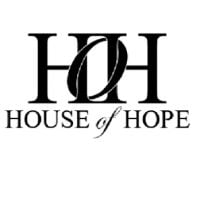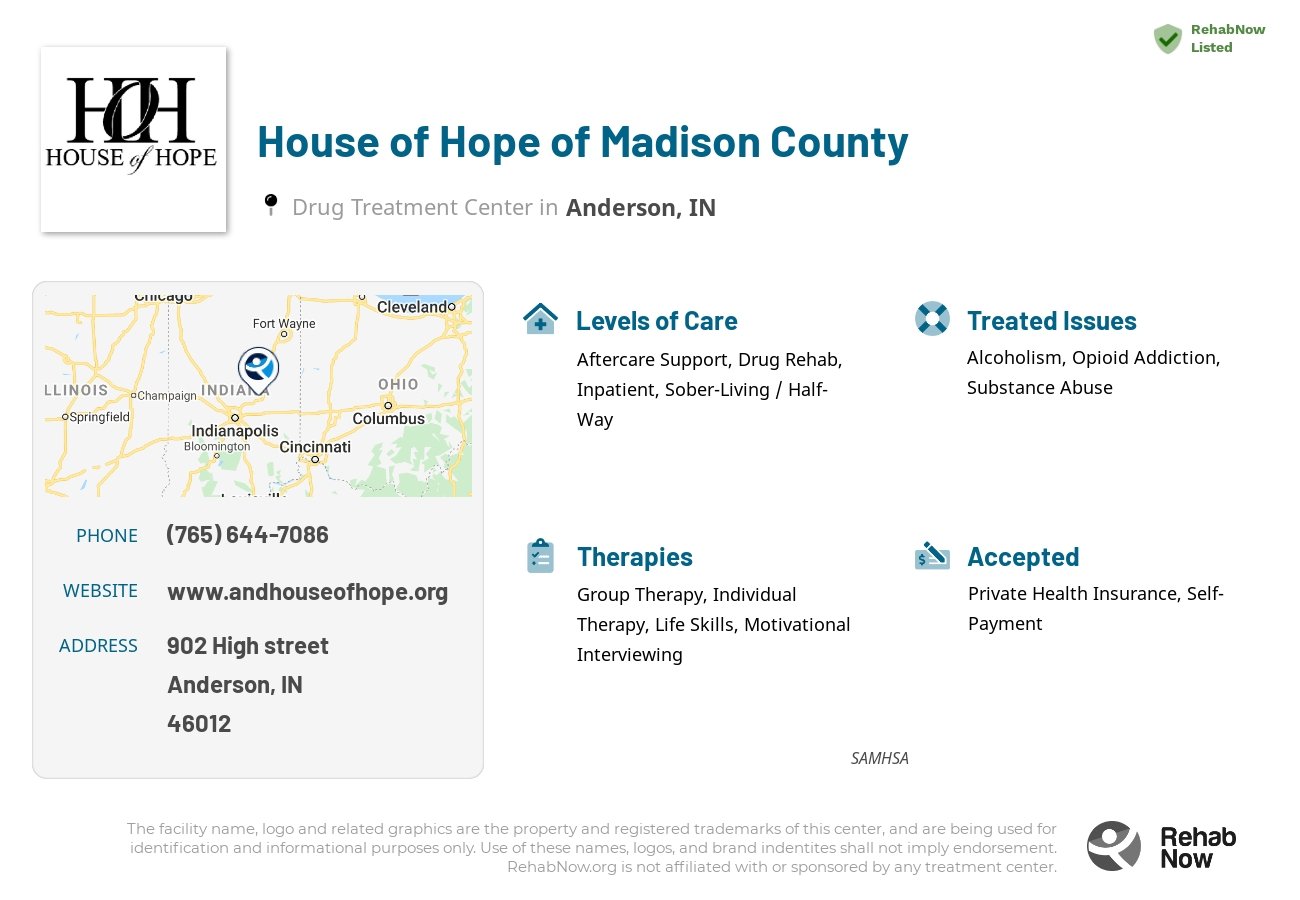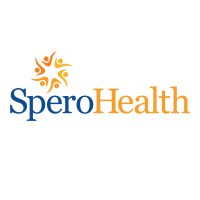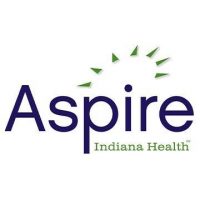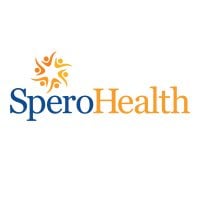House of Hope of Madison County
Drug Rehab Center in Anderson, Indiana
House of Hope of Madison County is an accredited, affordable drug rehab facility that provides a range of residential and outpatient services as well as aftercare support to help individuals sustain sobriety, all in a 28-bed setting.
About This Indiana Facility
House of Hope of Madison County, nestled in Anderson, IN, operates as a non-profit dedicated to assisting men on their journey to sobriety from drug or alcohol dependency. This establishment shines with its unique 90-day program tailored for those who have participated in AA or NA programs or completed chemical dependence treatments. With a comforting capacity of 28 beds, House of Hope is focused on recovery and rebuilding lives.
Accredited by the Substance Abuse and Mental Health Services Administration (SAMHSA), this certified facility is equipped to handle a wide array of substance addiction issues. Beyond its accommodation, House of Hope aims to deliver personalized and intensive treatment plans, emphasizing the significance of a path paved with support and structured care.
- Transitional Living: Offers sober-living and halfway houses as a bridge between treatment and reintegration into society.
- Personalized Treatment Plans: Develops tailored rehabilitation programs, addressing the unique recovery needs of each individual.
- Aftercare Support: Provides ongoing assistance to help maintain sobriety and support reentry into community life.
At House of Hope of Madison County, the battle against alcoholism, opioid addiction, substance abuse, and related mental health issues is met with a broad spectrum of treatment methods. From inpatient care ensuring 24/7 support to intervention programs aimed at guiding individuals toward the first step in their recovery journey, each method is part of a comprehensive approach designed to foster long-term recovery and well-being.
Genders
Ages
Modality
Additional
Accreditations
SAMHSA
Conditions and Issues Treated
A drug abuser needs help because if no one helps them, they will not leave their vicious circle.
People who abuse drugs are likely to suffer from an addiction, which can cause serious health problems. It can also cause quarrels with people around them. It is common for drug abusers to have difficulty holding down jobs or relationships, but sometimes people around them can be quite tolerant. There are cases where the families of the drug abusers do not want to see them get any help, and the subject becomes controversial.
When it comes to helping drug abusers get sober, there are many options to choose from. It is essential to state that there is no “correct” way of doing things. People are different, and they need different types of help to get over their addiction.
Opioid addiction treatment should be done in a medically supervised drug rehab. Opioid addiction treatment will include detoxification and drug rehab counseling to help both the user and their loved ones learn how to live a successful sober lifestyle. Methadone, buprenorphine, and naltrexone are three medications that can help treat opioid addiction. Individual drug rehab counseling sessions can be helpful to discuss any questions or concerns with the drug treatment program.
Levels of Care Offered at House of Hope of Madison County
This center offers a variety of custom treatment tailored to individual recovery. Currently available are Aftercare Support, Drug Rehab, Inpatient, Intervention, Residential, Sober-Living / Half-Way, with additional therapies available as listed below.
Inpatient treatment is an option that provides addicts with a supportive environment in which they can stop using. This type of intensive care and supervision is appropriate for those who were unable to quit on their own or need more structure than they could get from outpatient treatment, such as the addict most in need of this level of care.
The goal of inpatient rehab is for the addict to stay focused on sobriety and remain free of mood altering substances. Inpatient treatment programs usually offer the following: detox, therapy groups, one-on-one counseling, medication management and aftercare planning.
Sober Living Homes are used in drug rehab to help former addicts maintain sobriety. The staff provides the residents with a safe and supportive living environment to learn how to live a sober life. The staff members also provide the residents with resources to equip themselves better to live a sober life. They also provide them with opportunities for exercise, many of which encourage learning coping mechanisms that will be helpful later on.
Residential treatment programs are those that offer housing and meals in addition to substance abuse treatment. Rehab facilities that offer residential treatment allow patients to focus solely on recovery, in an environment totally separate from their lives. Some rehab centers specialize in short-term residential treatment (a few days to a week or two), while others solely provide treatment on a long-term basis (several weeks to months). Some offer both, and tailor treatment to the patient’s individual requirements.
Intervention services are designed to help family members and friends confront an addict about their drug use. While some addicts will immediately seek treatment after this confrontation, others don’t want to quit or need professional help with the process.
During an intervention, family members and friends work with a professional interventionist who will lead them through the discussion. This professional will help the addict understand that they need to get treatment and provide them with resources for recovery.
Aftercare is a part of drug rehabilitation. It is also known as “post-treatment support.” Aftercare programs are available for addicts after they complete drug rehab. It is often the final step in the recovery process. The goal of aftercare is to ensure that addicts maintain their achievements in rehab and do not relapse. Professionals generally provide aftercare (including addiction therapists, physicians, social workers, psychologists) and involve individual and group therapy sessions.
Therapies & Programs
Individual therapy is a critical component of addiction recovery. It allows the patients to go deep into their core issues and discover how to handle those problems better. Therapy can be conducted in individual sessions as well as group settings. In individual therapy for addiction, the patient meets with their therapist one-on-one to focus on the underlying issues. This allows patients to open up and discuss personal topics they may not feel comfortable discussing in a group setting. This type of therapy can help develop solutions specific to each patient, which helps speed up the recovery process.
Family therapy is a crucial part of drug treatment and getting sober. It is one of the most effective ways to help addicts stay on the path to long-term sobriety. When a drug addict decides that they want to try and get sober, it takes the support of every person they love to succeed. It can be incredibly difficult for loved ones to watch an addict go through the pain and suffering of withdrawal, but by being there with them and supporting them, they can help to make sure that the addiction never returns.
One of the most important parts of family therapy is the relapse prevention plan. During treatment, therapists and doctors will often sit down with the addict and their family to develop a plan in case the addict ever feels like they want to use again. This plan should involve steps the addict and family can take together to prevent them from relapsing in the future. An addict’s family can play a vital part in helping them to avoid relapse because they can spot the warning signs and help them get back on track before it becomes too much of a problem.
Group therapy helps prevent addicts from feeling isolated or unique in their situation by offering a sense of comfort and fellowship. It also creates a forum for addicts to build their support systems and learn from each other. The group therapy sessions at House of Hope of Madison County occur in a group setting rather than one-on-one to create a safer, controlled environment where addicts feel comfortable.
Cognitive Behavioral Therapy (CBT) is a common therapeutic approach to help drug addicts. It teaches addicts new ways of thinking and behaving so that they can avoid relapse. There are several forms of CBT used in drug rehabilitation centers.
Cognitive Restructuring helps addicts identify faulty, negative thinking so that they can work together with the therapist to find healthier ways of thinking, resulting in better decision-making.
Cognitive Behavioral Therapy for Addiction uses the principles of CBT to help treat addiction. It focuses on specific aspects of each person’s thinking, feeling, physiology, and behavior. It aims to identify specific problems in these areas and create a personalized treatment strategy.
The best drug treatment centers offer various services to help addicts learn how to live without drugs. Since addiction is a chronic physical and mental illness, addicts need to learn as many life skills as possible to help them stay clean and sober.
Many drug treatment centers like House of Hope of Madison County offer life skills activities as part of their addiction recovery programs. Examples include cooking classes, employment training, resume writing seminars, parenting classes, and computer training. When addicts have various life skills to lean on, they’re better equipped to put their addiction behind them for good.
The primary goal of life skills activities at drug treatment centers like House of Hope of Madison County is to help addicts recover from addiction and learn how to live a useful, productive life. Life skills activities help addicts find employment, take care of their families, and give back to the community. After learning about these various life skills, addicts are better prepared to return to society and lead happy healthy lives.
Entering a 12-step program allows people to accept that they struggle with an addiction on their own terms. It breaks down the process into 12 steps and gives recovering patients the ability to self help themselves without feeling rushed.
In Alcoholics Anonymous, members follow “The Big Book,” which contains guidelines for sobriety and offers support from fellow participants who have been through similar struggles. Many drug users also turn to Narcotics Anonymous or Pills Anonymous when they are looking at seeking treatment.
Both Narcotics Anonymous and Alcoholics Anonymous have 12 steps in common. They address issues that include ‘admitting there is a problem,’ taking control of the addiction, learning to listen to others without judgment, making amends, and more.
Payment Options Accepted
For specific insurance or payment methods please contact us.
Is your insurance accepted?
Ask an expert, call (888) 674-0062
Additional Details
Specifics, location, and helpful extra information.
Anderson, Indiana 46012 Phone Number(765) 644-7086 Meta DetailsUpdated April 15, 2024
Staff Verified
Patient Reviews
There are no reviews yet. Be the first one to write one.
Anderson, Indiana Addiction Information
The state of Indiana ranks 14th in the nation for drug abuse, but 17th for drug overdoses. The state has many high-quality rehabilitation centers, but reports show that there are about 20 deaths per 100,000 people. This is due to its location making it a drug trafficking haven, where many drugs are further distributed into the country.
Almost five percent of the population in Anderson, IN is struggling with substance abuse problems. The most commonly misused substances in Anderson include alcohol, marijuana, methamphetamine, heroin, prescription drugs, cocaine, and club drugs. In 2017, about 10 people died from opioid overdoses in Anderson. In 2018, 55% of those arrested for drug violations were younger than thirty years old. Common drug treatment options include inpatient rehabilitation and 12-step programs.
Treatment in Nearby Cities
- Rushville, IN (36.9 mi.)
- Brownsburg, IN (43.0 mi.)
- Anderson, IN (0.9 mi.)
- Muncie, IN (15.9 mi.)
- Mishawaka, IN (110.1 mi.)
Centers near House of Hope of Madison County
The facility name, logo and brand are the property and registered trademarks of House of Hope of Madison County, and are being used for identification and informational purposes only. Use of these names, logos and brands shall not imply endorsement. RehabNow.org is not affiliated with or sponsored by House of Hope of Madison County.
